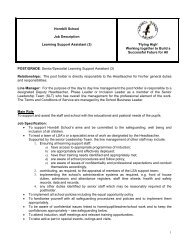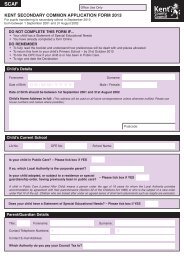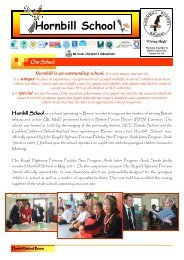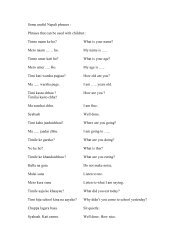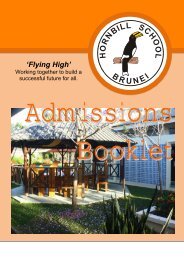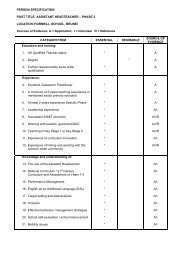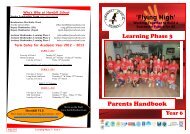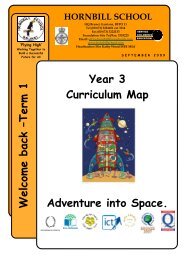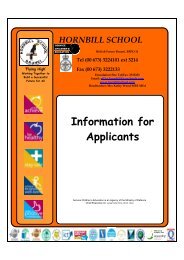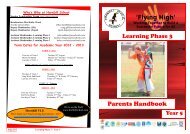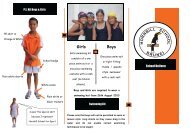2009-2010 - Hornbill School Website
2009-2010 - Hornbill School Website
2009-2010 - Hornbill School Website
You also want an ePaper? Increase the reach of your titles
YUMPU automatically turns print PDFs into web optimized ePapers that Google loves.
30<br />
learner’s home language, responses from the learner in L1 will provide a<br />
picture of the child’s level of fluency and literacy in their home language and<br />
L1 responses can be included in the recording form for the assessment.<br />
7. NSTs and support staff are strongly advised to work closely with the<br />
parents of all children requiring EAL support. Parents should be welcomed<br />
positively into Foundation Stage and school settings. A welcome poster in<br />
Nepali is a positive sign to parents that they are welcome. There are many<br />
other strategies which help to develop pleasant, cooperative liaison and<br />
contribute towards the enrichment of the school environment:-<br />
• Learning phrases for greetings in Nepali by non-Nepali staff can be a<br />
positive welcome to bilingual parents;<br />
• Parents should be encouraged to:<br />
Stay or return early for their children in the first few days<br />
Share their skills in Foundation Stage or <strong>School</strong> settings<br />
‣ Cooking<br />
‣ Painting<br />
‣ Storytelling<br />
• Parents and children should be encouraged to use their home<br />
language;<br />
• Parents should, if possible, be included in workshop sessions to<br />
produce materials relevant to bilingual children.<br />
‣ Story books<br />
‣ Dual language taped stories<br />
‣ Games<br />
‣ Name labels in home language<br />
‣ Materials to do with festivals<br />
‣ Parents can promote positive images through their direct<br />
involvement in Foundation Stage or <strong>School</strong> settings.<br />
Support Programmes and Levels of Intervention<br />
Monitoring<br />
Where a teacher believes there may be a specific need, which could be met by a<br />
support programme, but due to the child’s recent arrival and our knowledge that<br />
language acquisition can normally take up to 2 years, we simply monitor the child’s<br />
progress to ensure it follows normal language acquisition.<br />
Reading Programme<br />
This is a support programme that increases the number of times a child is heard<br />
reading in school by NSTs or a member of the EAL support team.<br />
Jolly Phonics<br />
Jolly Phonics is an organised programme of support for individuals, groups and<br />
whole class where the Jolly Phonics content is delivered.<br />
Toe-by-Toe<br />
Toe-by-Toe is a structured reading programme to support and accelerate the<br />
reading age of a student, with or without reading difficulties, far in advance of



